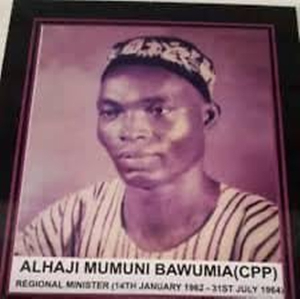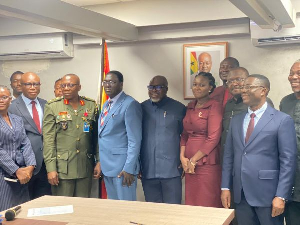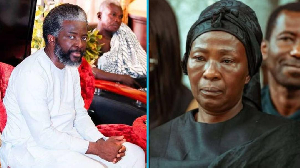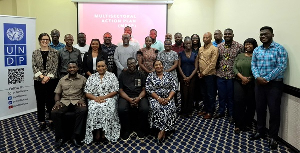Beginning this year, precisely 20th February 2012, a very sensational news item was published by the Daily Guide about the supposedly capture of Maame Wata (The water godddess). The caption of the news was “Maame Water Grips Bui.” It was also reported in the same news that, the Maame Wata was “behind the mysterious destruction of the bridge being built across the dam. It took a team of Chinese spiritualists employed from China to trap it, the reports claim.”
The sensational news agency Daily Guide, wrote that “DAILY GUIDE has the video footage of the mermaid which was allegedly taken by some residents of Tain and Chinese officials.” Please check the full news item from here [http://www.dailyguideghana.com/?p=39737]
I had a very bad impression when I read the news and hence decided to do further research on the so-called “marmaid creature.” My findings proved that the allerged capture was a scam and nothing of that sort ever happened? Refer to my article “Scam Alert: Maame Water grips Bui”
[http://www.ghanaweb.com/GhanaHomePage/features/artikel.php?ID=230845]
The question is, why didn’t Daily Guide know that this was a made believe story? Did they verify the so-called video?
Some of you may agree with me that the level of our journalism in Ghana is not up to standard; from news reportage to digging out stories. The journalists only feed the country with second hand information and most of the time sensational news which generate tribal and political tension without cutting a clean edge. Today, the true arts of journalism is in fact a matter of a problem in Ghana.
Since September 21, 2009, CNN International introduced what is now known as “Go Beyond Borders.” In a write up about the project, Tony Maddox (EVP and Managing Director, CNN International) wrote, “We went through an extensive external and internal research process to ensure that we knew what our viewers valued in us and expected of us. Knowing that helped us arrive at “Go Beyond Borders” as an articulation of our shared values and our commitment to delivering intelligent news in a connected world.” He further concluded by saying, “CNN goes beyond borders every day, taking viewers beyond the headlines to a transparent, diverse and intelligent product that connects viewers to the world’s stories. Our viewers go beyond borders every day, seeking out intelligent newsgathering on multiple platforms and this tagline will speak directly to their aspirations.”
CNN might be a higher media enterprise to compare with our media in Ghana but the philosophical idea in journalism is to produce stories through extensive research to provide a transparent, coherent and intelligent story that leaves no stone unturned. As it has always been said in Black preaching “No perspiration, no inspiration” so it’s said in journalism “A journalist is only as good as his sources.” A good story indeed needs a hard work. It demands sweat to hit the nail in.
A very catastrophic phenomenon which has cast a shadow on Ghanaian journalism is training. Some time ago I met a friend I knew very well and in the course of our conversation I asked him what he does for a living. He said am a journalist. I got a bit shocked because about a year ago as I knew him, he was not in any higher institution. So I asked him how. He then told me that he got a certificate in journalism from a six months course organized by a certain radio station.
My good friend calls himself a journalist after six month of training but in my opinion that wasn’t journalism. It’s radio-media training and hence he got a radio media certificate. These are the majority of people we have in the Ghanaian media today calling themselves journalists. So how do we call the one with a university degree in journalism? Well I really admire that the media can train certain individuals to fill certain entry-position levels in their companies.
Another challenge facing the Ghanaian media is the influence of politics. Journalism in the media industry has become as sickening as that of politics. Austin Cline wrote on his About.com page “The ideal of journalism is that reporters serve the public interest by pressing the powerful - political, commercial, social, religious - to explain themselves and justify their decisions which affect the rest of society. The reality of journalism is that reporters are part of the class of powerful and tend to serve their interests.”
Whenever a nation’s state of journalism becomes weakened by politics, the nation begins to head towards danger. I can give an example from Ghana. In 2009, some of the radio stations began to hang up on callers who intended to insult on air. But how come politicians were heard on radio stations insulting themselves? It means they were not cut off.
Ghanaian media can help to cause a positive change in Ghana only if they will practice correct journalism. They must work hard to expose the corrupt gurus in government. They must inject courage into their work to give ransom services to the entire nation. They must go to Yeji and capture the stumps in the Volta Lake (the largest artificial lake in the world) which is capsizing boats for government notice. They must give us updates of our Gold at Abuasi, how much government is earning and how many gold bars are sent outside the country every year. They must embark on analytical projects like “Why is it that every government leaves office with a huge amount of deficit?” They come in to meet deficit and leave topping up. They must do comparative studies about the Telecommunication Networks to see whether they are giving much to the state or perhaps exploiting the nation. I mean they must take journalism to the next level to liberate the country from many ill fated systems. This cut and paste, pirating news from other sources does not help much. We can get them ourselves on BBC, CNN, FOX News, etc.
As it’s said, “The voice of the people is the voice of God,” they must give a good voice to Ghanaians so can things turn around in the country. Other than that, Ghana’s retrogression could be a part of poor journalism.
NB: Please share your view on this article and respect opinion of other people. No insults please.
Clifford Owusu-Gyamfi
University of Lausanne, Switzerland
Opinions of Thursday, 26 April 2012
Columnist: Owusu-Gyamfi, Clifford














